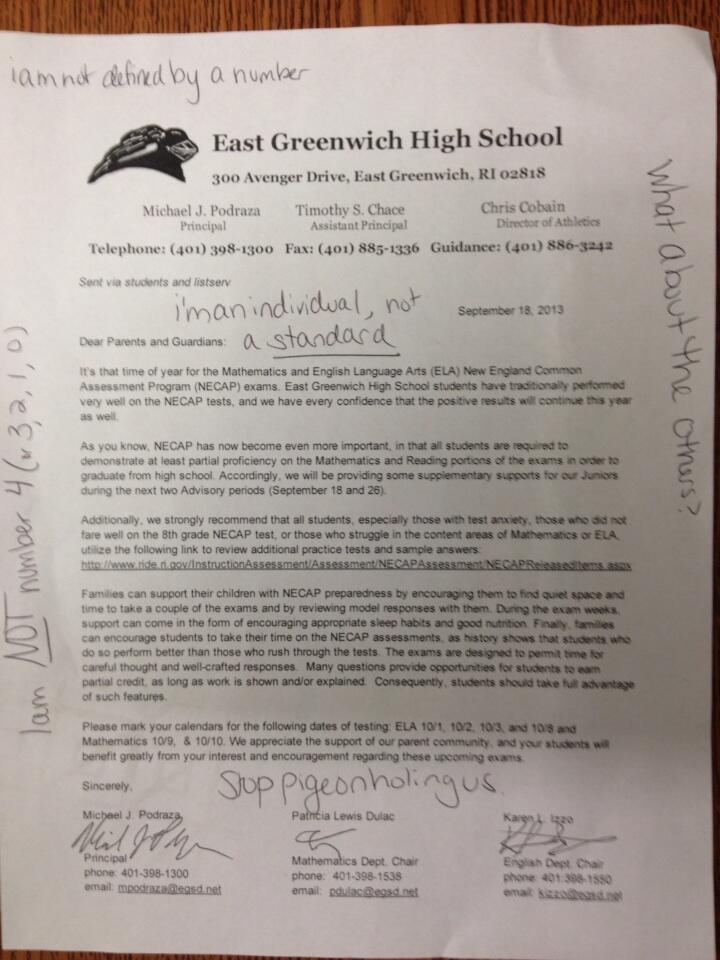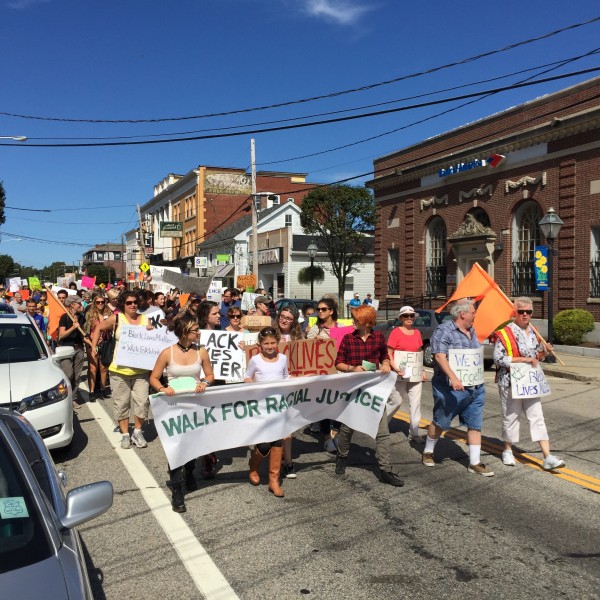
First came the killing of Michael Brown in Ferguson, Missouri, ensuing protests and videos of other unarmed black people around the country dying at the hands of police.
Then came white supremacist flyers delivered to some driveways in East Greenwich in June (“Earth’s most endangered species: the white race”).
Then came Sunday’s March for Racial Justice, which literally made a loop around my East Greenwich neighborhood.
This stuff is getting close to home!
East Greenwich is 92 percent white. That’s pretty pale. It’s easy to feel like we are not racist – maybe because we don’t have any race to bump up against. But if there’s one thing we’ve learned in the past 14 months, racism isn’t just white supremacist flyers. In fact, the most dangerous racism is living in a bubble where you don’t see there’s a problem.
Most of us moved to East Greenwich to live in that bubble, whether we did it overtly or not. We moved for the schools, we moved for the nice neighborhoods … we moved to be removed from the other. That’s the American way, the human way even. But it’s not the best way to live as one nation, united.
So it was good when, on Sunday in East Greenwich, about 200 people – mainly white – gathered at the Westminster Unitarian Church and marched down to Main Street and back (about 2 miles) chanting things like “What will we do for racial justice? Today we speak for racial justice.”
On Main Street. In my town.
Most of the marchers came from other places, but it was great to see many East Greenwich residents. Maybe a quarter of the marchers were from EG. That’s not a triumph. But it is a start.
]]>
A new report from the Economic Policy Institute (EPI) by Richard Rothstein titled The Making of Ferguson: Public Policies at the Root of its Troubles puts some of the recent brouhaha over RhodeMap RI into keen perspective. We all know the story of the police murder of Mike Brown in the St. Louis suburb of Ferguson, MO, the high profile demonstrations from the black community in response, and the heavy handed, militarized police reaction. The US Department of Justice released a shocking report of systemic racism and economic exploitation of the black citizens of Ferguson, but the report from the EPI provides insight into how a racially segregated, predominantly low income African-American community like Ferguson can develop in the first place.
Rothstein begins by blaming racial prejudice and racist public policy. “No doubt, private prejudice and suburbanites’ desire for homogenous affluent environments contributed to segregation in St. Louis and other metropolitan areas. But these explanations are too partial, and too conveniently excuse public policy from responsibility. A more powerful cause of metropolitan segregation in St. Louis and nationwide has been the explicit intents of federal, state, and local governments to create racially segregated metropolises.”
It’s important to understand that the policies Rothstein exposes in his report are not located only in the immediate area of St. Louis, these policies existed across the nation, and even where such policies no longer officially exist, their effects can still be felt today. These policies, according to Rothstein, include:
- Government subsidies for white suburban developments that excluded blacks, depriving African Americans of the 20th century home-equity driven wealth gains reaped by whites;
- Denial of adequate municipal services in ghettos, leading to slum conditions in black neighborhoods that reinforced whites’ conviction that “blacks” and “slums” were synonymous;
- Boundary, annexation, spot zoning, and municipal incorporation policies designed to remove African Americans from residence near white neighborhoods, or to prevent them from establishing residence near white neighborhoods;
- Urban renewal and redevelopment programs to shift ghetto locations, in the guise of cleaning up those slums.
 RhodeMap RI was developed with an understanding of many of the problems Rothstein cites. The public review draft of RhodeMap has a section at the end concentrating on social equity that explicitly called on the plan to “implement a new economic model based on equity, fairness, and opportunity.” It is this part of the plan, the part that seeks to undo the kind of problems that plague communities of color like Ferguson, that seems to most bother RhodeMap opponents.
RhodeMap RI was developed with an understanding of many of the problems Rothstein cites. The public review draft of RhodeMap has a section at the end concentrating on social equity that explicitly called on the plan to “implement a new economic model based on equity, fairness, and opportunity.” It is this part of the plan, the part that seeks to undo the kind of problems that plague communities of color like Ferguson, that seems to most bother RhodeMap opponents.
Rothstein takes a shot at offering possible solutions towards the end of his report, writing, “Many practical programs and regulatory strategies can address problems of Ferguson and similar communities nationwide.” For instance, governments might “require even outer-ring suburbs to repeal zoning ordinances that prohibit construction of housing that lower- or moderate-income residents – white or black – can afford. Going further, we could require every community to permit development of housing to accommodate a ‘fair share’ of its region’s low-income and minority populations…”
- Racial injustice vs. property rights: Ferguson and RhodeMap
- Gary Morse stokes suburban fears with racially charged half truths
- Setting the record straight on RhodeMapRI
- RhodeMapRI opponents fear future plans, affordable housing
Rhode Island has something of a fair share law (as part of the Rhode Island Comprehensive Housing Production and Rehabilitation Act of 2004 and Rhode Island Low and Moderate Income Housing Act (Rhode Island General Laws 45-53)) which sets a 10% goal for each of the state’s cities and town to meet—the goal being that 10% of the units in a town are “affordable.”
Most of the pushback against RhodeMap comes from communities that have very little affordable rental housing and are predominantly White. Legislation to undermine existing laws requiring cities and towns to plan for affordable housing is part of that pushback , such as House Bill 5643, which would “eliminate the mandate requiring cities and towns to include an affordable housing program in their comprehensive plans” or House Bill 5644 which “would remove the mandate requiring cities and towns to include an affordable housing program in their comprehensive plans and would provide an opt-out provision regarding any provision in the state guide plan regarding affordable housing and any related land use provisions” are naked attempts to keep affordable housing, and those who need it, out of their communities.
The legislators who are introducing and supporting the bills are all Republicans, or in one case an “Independent” representing primarily suburban and rural communities like Richmond (Note: part of Rep. Justin Price’s district), West Greenwich (part of Rep. Sherry Robert’s district) Coventry, Hopkinton, Charlestown, Portsmouth, Exeter and East Greenwich. Note that Richmond and West Greenwich have made “no progress” and East Greenwich has made “no significant progress” in meeting the 10% goal.
Undoing the damage of decades of racist housing policy and preventing future Fergusons requires a plan. RhodeMap RI isn’t quite that plan, it’s more a collection of guidelines to help communities develop a plan, but it’s a good step in the right direction. Those opposed to RhodeMap like to put on their “free market” hats and declare that any government intervention into housing is some sort of fascist violation of property rights. However, racially segregated housing is the product of just the kind of government sponsored social engineering that RhodeMap opponents complain of, and many of those opponents have also waged fights to prevent construction of affordable rental units in places such as Barrington and East Greenwich.
To be consistent these defenders of the free market should be calling for a repeal of all zoning restrictions in their communities, but of course they will not. Instead, they will zealously guard the status quo by defending zoning laws that the prevent construction of low income housing too close to their safe suburban enclaves. Opponents of RhodeMap object to being called racists, but when their claims of defending property rights are not equally applied to property owners who want to build affordable housing on their land, what else are we to think?
]]>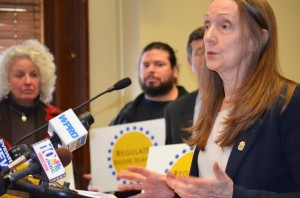
The East Greenwich Town Council is considering implementing a moratorium on medical marijuana compassion centers at a meeting tonight to which Steve Brown, executive director of the RI ACLU, said “I do not believe municipalities have the authority to essentially halt the implementation of the law at their borders.”
The formal Town Council agenda is broadly worded. It says under new business, “A moratorium on marijuana compassion centers, hookah bars and the growth, sale or distribution of marijuana.” But Council President Michael Isaacs said in an interview that a moratorium is only intended to apply to medical marijuana dispensaries, where patients can legally obtain medical marijuana.
“It was supposed to be narrowly focused,” Isaacs said, noting he hasn’t yet seen the language – but he said he expects the council will vote on it tonight. The Council decided to consider this because of “articles in law review journals about potential zoning conflicts,” he said. “Zoning has to do with the appropriateness of an activity in the community or in a particular part of a community.”
Brown, longtime director of the RI ACLU, said the town can’t decide which state laws it wants to follow. “State law establishes a very detailed scheme for the medical marijuana program and compassion centers,” he said. “It completely undermines state policy as reflected in the Medical Marijuana Act.”
Brown said there exists procedures for municipalities to weigh in if a compassion center applies to locate there, which none have done, according to the state Department of Health.
“Regarding compassion centers,” Brown said, “it is important to note that exclusive jurisdiction is vested in the Department of Health to issue compassion center permits. One of the criteria to be used by the Department is to consider is “the interests of the city or town where the dispensary would be located.” Other than providing that input, a municipality should not be able to then undermine the detailed regulatory analysis the Department has undertaken, in accordance with the law, in making its decision as to whom — and where — to grant a compassion center license.”
Brown said there are different issues if the Council were to try to ban individual care providers who grow medical marijuana.
“The problem is just as acute for medical marijuana users,” Brown said, “They have the right under state law to cultivate medical marijuana for their own use. A municipal attempt to bar medical marijuana users from growing the medicine is a direct attack on the right the Medical Marijuana Act gives them and cannot be lawfully imposed. As a practical matter, a moratorium would have the ironic effect of actually encouraging legitimate medical marijuana users to obtain their marijuana illegally.”
Jared Moffat, director of Regulate RI, a group pushing to tax and regulate marijuana in Rhode Island, echoed Brown’s concerns.
“Banning state-sanctioned compassion centers and licensed caregivers from cultivating marijuana will only reduce access to an important medicine for chronically ill patients and might force more patients to turn to the illicit market,” he said. “Outright prohibition is the worst possible policy for marijuana, and it is disappointing to see East Greenwich potentially going down that road.”
]]> Is equal equitable with regard to state education funding? As it happens, even a progressive state funding formula isn’t equitable when it comes to helping Rhode Island’s economically diverse cities and towns provide an adequate education to all.
Is equal equitable with regard to state education funding? As it happens, even a progressive state funding formula isn’t equitable when it comes to helping Rhode Island’s economically diverse cities and towns provide an adequate education to all.
That’s what Pawtucket and Woonsocket are arguing before the state Supreme Court in a case that claims the state is unconstitutionally depriving these two school districts of its ability to properly educate its children.
The Department of Education says that the state constitution doesn’t obligate it to provide an adequate, equal or equitable education – only that it “promote” public education. Furthermore, many suburban school committee members, policy analysts and small government activists have pointed out that Rhode Island already imposes a progressive (i.e. not regressive) formula for funding local school districts based on need.
Comparing per-pupil spending between some of Rhode Island’s richest suburbs and poorest cities, it seems they are correct. Barrington and East Greenwich get about 10 percent of their per-pupil education budget from the state and Woonsocket and Pawtucket get more than 60 percent per pupil from the state. In 2014, the state will pay $8,562 per pupil in Woonsocket and $8,270 in Pawtucket. Conversely, the state will pay $1,056 per pupil in Barrington and $987 in East Greenwich. (Ed. note: RIDE does not keep per pupil state aid data, according to RIDE spokesman Elliot Krieger, but you can do the math by dividing column H of this spreadsheet by column A of this spreadsheet, according to RIDE’s Office of Statewide Efficiencies Director Cynthia Brown.)
“At an order of magnitude difference Rhode Island’s funding formula sure does a lot of work to equalize spending,” said Jason Becker, who helped author the 2010 funding formula that Woonsocket and Pawtucket are challenging in court. “I don’t see how the state could do more without dramatically increasing the amount of state funding for education. With our budget and revenue issues I don’t see that happening anytime soon.”
But even with a progressive funding formula (the previous formula was not dramatically different for the richest and poorest communities) the results have been unequivocally regressive.
Take NECAP test results, for example. Barrington and East Greenwich 11th graders both scored 70 percent proficient on their math NECAP while Woonsocket 11th graders were 21 percent proficient and in Pawtucket 20 percent were proficient.
Perhaps the answer lies not within how much the aid the state gives each district, but how much aid each district needs. As Becker notes, the state funding formula equalizes spending. Even though Woonsocket and Pawtucket students have vastly different educational needs than East Greenwich and Barrington students, all four educations cost roughly the same.
In 2011, the most recent year I was able to find data on RIDE’s website, (Ed. note: still waiting to hear from RIDE Statewide Effeciencies Office if there is more recent data elsewhere), the average Woonsocket student cost $13,485 to educate and the average Pawtucket student cost $13,007. Meanwhile, the average East Greenwich student cost $13,973 and the average Barrington student cost $12,708. UPDATE: 2012 comparison here, courtesy of Elliot Krieger.
That may be equal. But considering the affluent suburbs seem to be able to do much more with a similar amount of money, it doesn’t seem equitable. Not even close.
East Greenwich recently built a brand new, “state-of-the-art” middle school building and also completed three major construction projects at the high school including an astroturf football stadium, a new entrance facade and new science labs. And next year, the EG School Committee plans to give every high school student their own laptop computer and add a staff member to facilitate the new program.
Meanwhile, this is what Providence City Councilor Sam Zurier, who is litigating the equitable funding lawsuit on behalf of Pawtucket and Woonsocket, said about the situation in Pawtucket:
“Pawtucket cannot afford to issue a separate text book for every child in some of its schools. You have laboratories with mold in them, the plumbing doesn’t work. You have classes in the elementary school that has two grades being taught by the same teacher. It’s often the case that schools run out of paper this time of year.”
]]>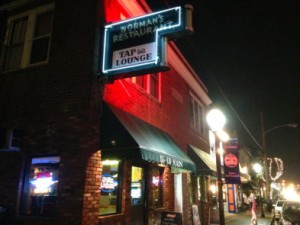 Here’s the story of a man who has run a small business in downtown East Greenwich for more than 50 years who may lose his livelihood – a local institution and one of the hallmark properties on Main Street – because he fell behind on his sewer bill.
Here’s the story of a man who has run a small business in downtown East Greenwich for more than 50 years who may lose his livelihood – a local institution and one of the hallmark properties on Main Street – because he fell behind on his sewer bill.
Norman Harris owns a dive bar/greasy spoon diner right in the heart of historic downtown East Greenwich and he is three-years delinquent on his sewer bills to the tune of $32,000. Some of that debt belongs to his business but the bulk of it comes from the five apartments connected to the restaurant that are occupied by family members.
The Town Council is threatening to revoke his liquor license if he can’t pay the debt in one lump sum.
Sharon Hazard, who runs the restaurant for her elderly father, told the Town Council that tough economic times plus a major money setback as a result of identity theft has left the family finances in shambles – and that they are even willing to remortgage their property to make the town whole. Still, she was berated by two of the elected officials.
Councilor Mark Gee lectured Hazard about how he too had faced hard times and never fell behind on his taxes. “To me it’s almost a little abusive to the town,” he said to her at a public meeting two weeks ago. Councilor Jeff Cianciolo forced Hazard to come back in two weeks with a title search, even though she told the Council she had already paid for one to be completed within the next two months. He wants the debt paid off in one lump sum. Council President Michael Isaacs was more understanding. He said, “We should exhibit some flexibility on this. I think they do need some time to work this out.”
Some see the Harris’ plight as just the cold, harsh realities of an unfriendly economy, and the delinquent sewer bill is the straw that broke the Harris’ business model. Others, like Councilor Gee, see it as a fairness issue; if you don’t have enough money to pay the town for your real property, you don’t get to keep your real property (unless you might turn it into a science center someday, more on this coming up).
And in the parts of town where Norman’s customers still live, a world away from the expensive track homes that constitute most of East Greenwich’s affluence, there are those who think it’s latent racism, class intolerance and a blatant attempt to socially engineer the Harris family off of Main Street.
The Harris’ are known locally as “the only black family in East Greenwich.” Of course this isn’t true, but it can certainly seem that way in lily white suburbia. As a point of fact, the Harris’ are bi-racial, and trace their roots back to the pre-Columbus Narragansett Tribe. (And other black people do live in town.) Perhaps more relevant than their skin color is their style. Many of the Harris’ just don’t look like modern day East Greenwich: think Swamp Yankee rather than soccer mom.
And their business attracts a rough crowd to an otherwise very gentrified center of commerce and community. I’d even go so far as to say the Harris’ can be a rough bunch themselves, and their tavern can be downright dangerous late at night. There’s a pool table, an ashtray out front and it serves cheap beer right across the street from a hotel that rents rooms by the week and/or month. People down on their luck get a room at the Greenwich Hotel, and find some friends across the street at Norman’s Tap. But that tale doesn’t always end well. The police are there frequently on Friday nights to break up fights.
It’s well worth noting that while Norman’s is a rough bar, it is not the roughest one in town. Some of the newer upscale bars and restaurants also draw a police presence on the weekends. The waterfront bars, which attract more affluent out-of-towners than the crowd that stay at the Greenwich Hotel, require multiple officers be stationed there throughout the evening (for parking and crowd control). And the only assault with a deadly weapon in recent years, a stabbing with a fork, happened in one of Main Street’s more posh eateries.
And as far as their debt is concerned, or it being some sort of affront to the community that they have let it fester for so long, I was personally more offended when Don Carcieri left vacant for 12 years (and counting) a piece of prime real estate the town gave him because he said he would turn it into a science center. No public lecture for the Republican former governor from the all GOP Town Council though.
So why do the Harris’ receive such harsh treatment from some on the town council and many more on the internet? Why would the Town Council consider destroying a local business that has been operating on Main Street for 50 years because of the three years of debt? What public good would be accomplished by taking away their liquor license?
There is absolutely a number of very influential local conservatives who think Main Street and the downtown economy would be well served if Norman’s Tap would just go away. Whether or not they are right is beside the point. A delinquent sewer bill should not be used as a tool to take away someone’s livelihood simply because some influential Republicans think more gentrification will make for a better community.
]]>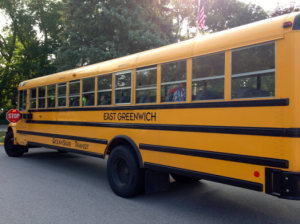 I’ll never forget when the East Greenwich School Committee considered outsourcing its custodians. It was as bitter a political battle as you’ll ever see in this high-brow suburban enclave. Conservatives claimed they needed to save money any way they could in order to offer the best education possible while local liberals said it was unfair to transfer wealth from working class janitors to the wealthy taxpayers of East Greenwich.
I’ll never forget when the East Greenwich School Committee considered outsourcing its custodians. It was as bitter a political battle as you’ll ever see in this high-brow suburban enclave. Conservatives claimed they needed to save money any way they could in order to offer the best education possible while local liberals said it was unfair to transfer wealth from working class janitors to the wealthy taxpayers of East Greenwich.
Another reason offered for not jobbing out public school staff to the private sector is many residents feared that private industry would place profits over safety and wouldn’t be as diligent in doing background checks on employees.
Three years later, the .
We will never know if the community could have been avoided this situation if employment was subject to greater public scrutiny, but we do know that this exact situation that is often the greatest fear of many who fight against privatization of public school services.
I sincerely hope no child is ever harmed in the name of saving taxpayers money.
]]>“I am an individual,” was written on the Principal Podraza’s note about the NECAP requirement. “I am not defined by a number. Stop pigeonholing us. What about the others.”
Podraza tweeted: “Dear #EGHSRI student who left this behind, I would love to talk to you & discuss b/c you & #EGHSMatters pic.twitter.com/NBlqyWF2Nz”
And here’s the picture of the handout, which says, “As you know, the NECAP has become even more important, in that all students are required to demonstrate at least partial proficiency on the Math and Reading portions of the exam in order o graduate from high school.”
]]>
Yesterday I thought it would be hard to put together a group of people who have been worse for Rhode Island than John DePetro, Don Carcieri and Bernie Healey. But Anthony Gemma proved me wildly off base by showing up as well.
If you missed my live-tweeting of conservative Catholic night at the Odeum Theater on Main Street, East Greenwich last night, don’t worry. You didn’t miss much.
The most exciting moments included DePetro probing Father Healey about whether or not people chew gum in church, Feroce scrolling through his smart phone to read aloud from his email or Carcieri talking about 38 Studios. Oh, that’s right, DePetro didn’t ask Carcieri about 38 Studios; instead they talked about how idyllic life was back in the days when Thanks Don was growing up.
I’m pretty sure Charlie Rose’s job is safe.
It was really more of a fundraiser for the struggling local theater than actual entertainment. Many, if not most, of the attendees were dyed-in-the-wool conservatives and more than a few were friends and/or relatives of the headliners. DePetro made more references to the local restaurant that sponsored the evening than he did to leadership, which was supposed to be the focus of the event. Local celebrity appearances were limited to former state Senator Frank Maher and Anthony Gemma.
Here’s a Storify of most of my tweets from last night and many of the responses I got.

What do former Governor Don Carcieri, Rev. Bernard Healey and John DePetro all have in common? The three biggest enemies of civil liberties in Rhode Island? Three people only popular on WPRO? Three people who progressives wish kept to themselves?
Even more precisely, these three pillars of Ocean State conservatism will be appearing together, on stage, Wednesday, May 8 at the Odeum Theater in the most infamously Republican town in Rhode Island, East Greenwich. (Ed. note: also RI Future headquarters) They’ll be joined by Alex and Ani CEO Giovanni “John” Feroce – who you may have known was a Republican state senator on Smith Hill from 1992 to 1994.
It’s part of the newly-renovated theater’s “mission of providing a variety of social, cultural and educational opportunities,” according to a press release sent by former Providence Journal and PBN editor Frank Prosnitz, who did not mention exactly which category this trio falls into.
It did say it was the first of a three part lecture series at the Odeum Theater for hometown boy John DePetro. Future guests will be unveiled by DePetro at a press conference today at 1 p.m. at the Odeum, 59 Main St.
]]>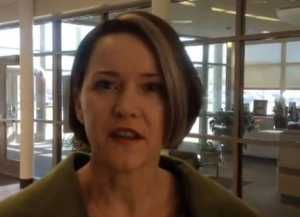
I went to an East Greenwich school this morning to interview state Education Commissioner Deborah Gist about the education disparity between the affluent suburbs in Rhode Island and the poorer inner cities. While I was waiting for her a 7th grade student came into the office to report finding a diamond.
This pretty much sums up public education in Rhode Island. In Central Falls, seven of ten students are in danger of not graduating. In East Greenwich, students literally find precious gems on the floor.
East Greenwich and Barrington offer better public education than Central Falls, Woonsocket, Providence and Pawtucket not because they have better students or better teachers or better test scores. It’s because they have more money.
It’s true that the state spends more on the average student from impoverished school districts than it does on the affluent ones, but even still it’s very hard to argue that kids in East Greenwich aren’t getting a much better education than kids from Central Falls are. In this clip, Gist admits that by her own metrics, EG students do get a better education than Central Falls students.
In fact, if resources were doled out by a school’s need rather than the public sector’s willingness to pay, students in Central Falls would get way more tax dollars than would students in East Greenwich. But we only use those metrics to decide who fails, not where to apply our resources. The state is implementing a new funding formula that will help, but it is not enough and it is being phased in very slowly to mitigate the hit to taxpayers.
In the meantime, the haves are getting a good public education in Rhode Island while the have-nots are not. The question is not whether we are doing more for the have-nots, the question is are we doing enough.
This is the single most important issue in local public education. Not whether we use test scores or grades to measure performance, and not whether we focus our resources on the many in traditional public schools or the few in pilot program charter schools, but how do we make sure kids in every corner of the state get good educations. Is it by giving them more tests, or is it by appropriating more resources? The right answer might not be the easiest or cheapest answer. It rarely is.
Here’s my full 7 minute interview with Gist.
]]>
